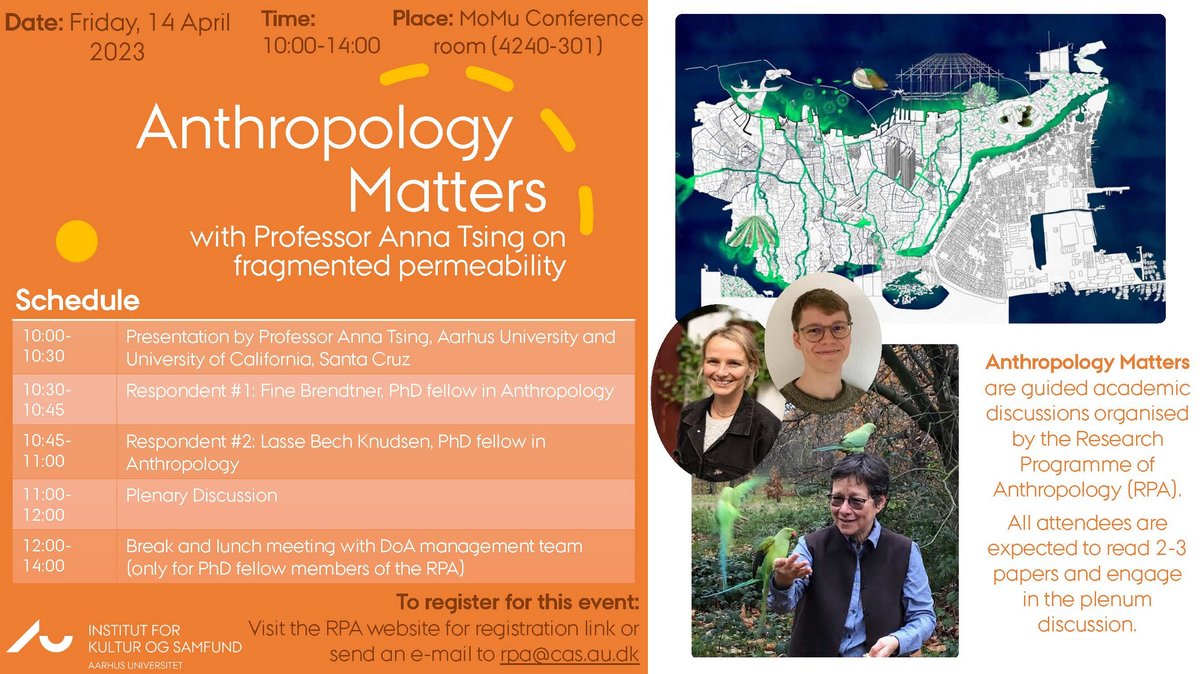Anthropology Matters with Professor Anna Tsing: Fragmented permeability
- Organised by the Research Programme of Anthropology (RPA) Speaker: Anna Tsing (AU/UCSC), Fine Brendtner and Lasse Bech Knudsen
Info about event
Time
Location
MoMu 4240-301

An example of geomorphology for anthropologists. Fragmented permeability: how builders have attacked coastal resilience
- Event followed by Lunch for PhD fellow members of the RPA only. Registration required.
Abstract
Anthropologists of late have become excited about thinking with geomorphology, that is, the shape of earth’s physical features. (See Jerry Zee’s Continent in Dust for one non-coastal example.) This seminar works from the larger question of anthropological geomorphology to consider the shaping of coasts as an important example.
Mangrove swamps and other wet-and-dry ecologies protect coasts from storms while also serving as rich sites of more-than-human livelihoods. Yet governments and corporations have been captured by a frenzy of coastal “hardening,” the separation of land and water. Why?
Separation has been a colonial governance project, suppressing the pirates, rebels, and smugglers that once made use of tiny inlets, swamps, and muddy bays. (See Julius Scott, The Common Wind, 2018, for a Caribbean example. Great books that explore colonial difficulties with shifting coastal mud include Amitav Ghosh, The Hungry Tide, 2004 [India]; Joseph Conrad, Outcast of the Islands, 1896 [Borneo], and David Biggs, Quagmire, 2010 [Vietnam].) Coastal hardening continues today at the intersection of governance and real estate. Land reclamation is an owner’s dream: land devoid of previous claims. Meanwhile, hardening projects have feral effects, including storms that knock down adjacent coastal settlements as well as flooding, erosion, loss of fish stocks, and new disease ecologies.
This seminar explores how anthropologists might address such matters of coastal geomorphology, including through spatial diagrams, such as this one, which illuminates PhD student Kirsten Keller’s research in Jakarta Bay. Our preparatory readings include an engineer’s account and two descriptions of feral (i.e., out of human control) effects.
Readings
(NB: we’ll forward readings to attendees who have signed-up via Webshop-link, TBA)
- J. van Veen, 1962. “Masters of the Flood,” In Dredge, Drain, Reclaim! The Art of a Nation, pp. 118-169, Martinus Nijhoff. [The perspective of an engineer]
- Camelia Dewan, 2021. “Simplifying Embankments,” In Misreading the Bengal Delta: Climate Change, Development, and Livelihoods in Coastal Bangladesh, pp. 21-47, University of Washington Press. [A Bangladesh example of hardening and its feral effects]
- Zahirah Suhaimi, n.d. [A draft chapter from an anthropology PhD student developing this concept in her dissertation; please read with generosity—this could be yours!]
What is Anthropology Matters?
Anthropology Matters are guided academic discussions for PhD student members of the Research Programme of Anthropology (RPA), but all are welcome. At each meeting, a faculty member presents a concept important to their research. Then two designated PhD students present how the concept in question relates to their research. The idea is to open up and push one's work in a new direction. All attendees are expected to read 2-3 papers and engage in the plenum discussion. We incite all RPA PhD students, resident in Aarhus, to attend this event
